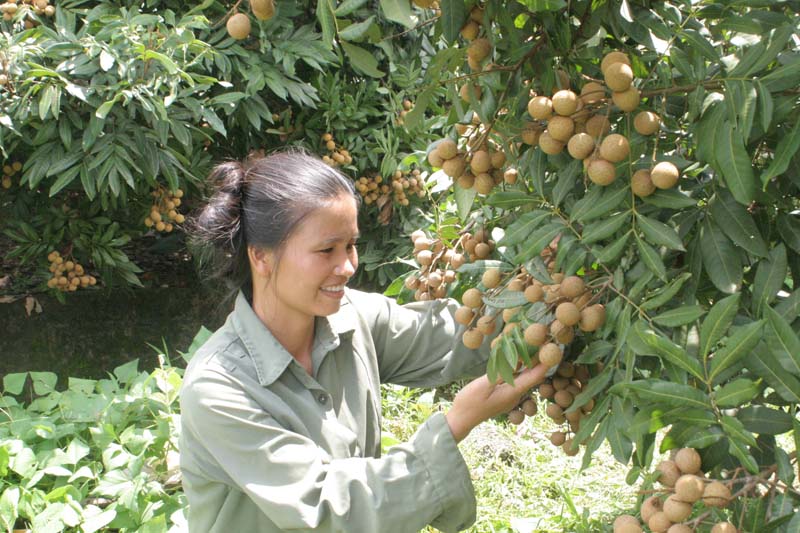
(HBO) – Kim Boi district has gained many important achievements over the half-term implementation of the Resolution of the district’s 22th Party Congress.

People in Khoang village, Son Thuy
commune, Kim Boi district have invested in longan farming to develop household business.
The district has mobilized different sources of funding to develop
local infrastructure, transfer technology and support people in scaling up
effective business models towards sustainable production closely linked with
distribution. Among the most successful are the farming of Thai jackfruit,
banana, gourd, baby cucumber and various varieties of rice.
At the same time, it has partnered with businesses and
organisations to develop a number of cooperative models, including an
84.7-hectare farm producing pumpkin for seeds, a 2.6-hectare farm of bitter
melon for seeds, 78.5 hectares of sweet corn, 15.3 hectares of Japanese
cucumber and 4 hectares of chili. This cooperation has opened up new opportunities
for farmers to shift to new plants suitable to the local conditions and
potential, hereby improving their income.
Life of people in the commune of 135 Thuong Bi region has
significantly improved thanks to efforts to diversify crops and expand new
farming models such as the cultivation of pumpkin for seeds, chili for export
and Thai jackfruit.
In recent years, Kim Boi has directed its communes to expand
citrus farming, particularly specialty varieties of orange and pomelo, like
yellow-flesh, V2 and sweet orange, Dien and green-skin pomelo, and Huong Chi
longan.
The district has formed specialized production areas. It is home
to 1,000 hectares of citrus farms, mostly in the communes of Kim Son, Tu Son,
Vinh Tien, Binh Son and My Hoa, and 230 hectares of longan farms in Son Thuy,
Thuong Bi and Bac Son communes. Some 200 hectares of pumpkin and bitter melon for
seeds and 500 hectares of gourd and pumpkin for commercial purposes have been
also developed in many communes./.
Dao Village’s honey – a product certified with a 3-star OCOP (One Commune One Product) rating by Thong Nhat Agricultural Cooperative in Dao Village (Hoa Binh City) – is highly regarded by consumers for its quality, richness, and variety in packaging. The distinctively sweet taste of Dao Village’s honey leaves a lasting impression on anyone who has tried it.
In alignment with Project No. 07-DA/TU, issued by the Hoa Binh provincial Party Committee on November 1, 2021, Lac Thuy district has actively promoted investment and supported the sustainable development of its industrial and handicraft sectors during the 2021–2025 period. Alongside this, the district has remained committed to preserving and revitalising traditional craft villages.
Located in the northern part of Lac Thuy district, with a temperate climate and fertile soil, Phu Thanh commune has great potential and advantages in growing tea. The long-standing experience, combined with strict adherence to organic farming practices in the tea gardens, ensures that the dried tea products from Phu Thanh and Lac Thuy as a whole are sold out immediately upon production, providing a stable and prosperous life for the local people.
Amid efforts to streamline the administrative apparatus, Hoa Binh province has intensified measures to address challenges in land clearance, resettlement support, and infrastructure investment, aiming to speed up the progress of key projects.
Hoa Binh province has posted an unprecedented economic growth rate of 12.76% in the first quarter of 2025, marking its highest quarterly performance to date and positioning it as the second fastest-growing locality in the country, trailing only Bac Giang province.
Under current regulations, products in the One Commune – One Product (OCOP) programme that are rated three stars or higher must undergo re-evaluation every three months. However, in reality, some of these products fail to consistently meet the required standards, raising concerns about the sustainability of their OCOP certification. This underscores the urgent need for producers to enhance product quality and gradually develop their OCOP products into strong, marketable brands.



